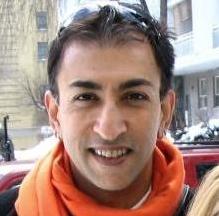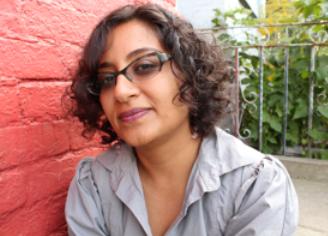
El-Farouk Khaki started Salaam, a social and support group for queer Muslims. Credit: Matt Mills
As countries in South Asia take strides toward legalizing homosexuality and even same-sex marriage, queer South Asians in Canada say their community continues to face a unique set of issues.
“There are many challenges that aren’t fully addressed in the mainstream — double and sometimes triple intersections of discrimination,” says Alex Sangha, the founder of Sher Vancouver, a social and support group for gay, lesbian, bisexual, transgender and intersex South Asian people and their allies.
“There’s so much stigma, there’s so much shame, there’s so much work that needs to be done in terms of raising awareness and creating a healthy environment for gay and lesbian and bisexual and transgender youths and minorities to come out.”
Sangha’s own coming-out experience was difficult, which he attributes in part to internalized homophobia and in part to familial and cultural pressure.
“It’s very hard to come out. I came out to my mom when I was 20, and it was actually my mom who asked me, ‘Are you gay?’ And I said I was bisexual because I was too embarrassed to be gay,” Sangha says.
El-Farouk Khaki, a gay and Muslim Toronto immigration lawyer who has been recognized for his work against racial discrimination in the queer community and homophobia in the Muslim community, also found the experience difficult.
“A really big issue in many traditional cultures is giving your parents grandchildren. It’s a cultural expectation, and it’s not just South Asians, it’s not just Muslims. And so being an only child made it particularly difficult for me,” says Khaki, who came out in his late teens and early 20s.
“In the South Asian community, which has become more conservative rather than opening up, you’re dealing then with language issues, religious issues, and then there’s racism and xenophobia,” Khaki says. “There remains this marginalization process within Canada as well, which does affect the coming-out process and the integration of LGBT people from South Asia and other racialized minority communities.”
These cultural expectations, along with others that Sangha says include heterosexual marriage, children, respect and family honour, can impede on individual personal freedoms. However, Khaki stresses that these expectations are not unique to South Asian queer people.
One of the most effective ways of combating traditionalism is through awareness. While the possible solutions are multi-faceted, inter-community interaction is key.
“When people come from traditional backgrounds, they may not know very many queer folk. So where is that point of reconciliation, and how and where and when does that come about? Particularly in North America, fostering interactions between communities is really important,” says Khaki.
One of the ways to do that is through community groups. Khaki is the founder of Salaam, a social and support group for queer Muslim people that has opened conversations about the intersection of race and sexuality.
“I started Salaam as a queer Muslim,” Khaki says. “I was often alone when it came to being one of the few people of colour within a queer crowd, and certainly within Muslim crowds nobody was out, so there was nobody else I could really connect or identify with. When I moved to Toronto in 1989, I started to meet for the first time other LGBT-identified Muslims, and even though intellectually I knew I was not the only one, it had never translated into a sense of community or a social space before.”
As a way of creating and sharing community, Khaki has hosted the Salaam/Peace Iftar dinner during Ramadan since 2003. The dinner, which is attended by queer and straight Muslims and non-Muslims and has grown from 130 participants to more than 300, is an opportunity for such interaction.
“It’s a bridge builder, and people get to know other people and get to shed their prejudices and get to break bread with people who they wouldn’t normally have broken bread with. I think events like that create these points of engagement,” Khaki says.
Community outreach, particularly for youths, is also important. Sher Vancouver runs the Dosti Project, through which outreach workers visit schools to speak about being gay and South Asian. Though the project is no longer funded by the federal government and currently operates on a reduced scale, Sangha says the response from students has been positive.
“They were incredibly supportive, and I see a big change happening in the next generation and the generation after that because I’m already seeing it in this generation. It’s good for people to come out and speak about these issues because it helps reduce the stigma, the discrimination, the alienation, the isolation that South Asians who are gay and lesbian face,” says Sangha.
Another way to create engagement and spread awareness is through art. Farzana Doctor, a Toronto-based social worker and the author of the novels Stealing Nasreen and Six Metres of Pavement, says that art provides a means of discussing topics that might be off-limits otherwise.
“I think that creative expression can be a powerful way of talking about queer and trans identities in any community, a way of bringing to light taboo subjects and stigmatized identities,” Doctor says. “These discussions make visible what is so often invisible. This is particularly important for younger or closeted people in our communities who might not know that queer and trans South Asians exist. It’s important that those of us who are privileged enough to come out, to write, make films and music about queer and trans life do so. We need many more people to take up these conversations. I especially feel that trans issues need to be discussed more in South Asian communities, as well as other communities.”
Doctor’s work addresses the South Asian diaspora, immigration, sexuality, loss and redemption. However, while she notes that her personal experiences influence her focus, they are not the sole force behind it.
“My personal experiences definitely influence these themes, because all of my writing is filtered through me. I’m a child of immigrants, queer, South Asian. I’ve suffered loss in my life. I’ve wanted to write stories that matter to me and to other people like me. On the other hand, many of these themes are fairly universal, and I think non-queer and non-South Asian people can relate as well,” she says.
Toronto artist Joshua Vettivelu also uses art as a lens for his experiences. His work appeared in Khush: A Show of Love. The exhibition, mounted at the Canadian Lesbian and Gay Archives last summer, focused on Khush, an organization that supported queer South Asian people in Toronto from 1987 to 1992. In Vettivelu’s performance piece, he covered his face with hot wax and tried to rip it off, and washed his hands in glitter to highlight how multiple identities intersect.
“It’s about the intersection of race and desire and sexuality as a kind of identity,” Vettivelu says. “I think that when you’re put in a non-normative body, you’re given a worldview that you know is different than a dominant one. For me, it’s a natural evolution to turn to art and to turn to theory like this to talk about my experiences, because it’s one medium in which there isn’t a dominant way of speaking, so you can break away from language linked to oppression.”
The Deets:
Gender, Sexuality and Creativity: Self-Expressions in the South Asian Diaspora
With Farzana Doctor, Vivek Shraya and Josh Vettivelu
Thurs, March 1, 3pm
York University, 4500 Keele St
280N York Lanes
yorku.ca/yuevents

 Why you can trust Xtra
Why you can trust Xtra


